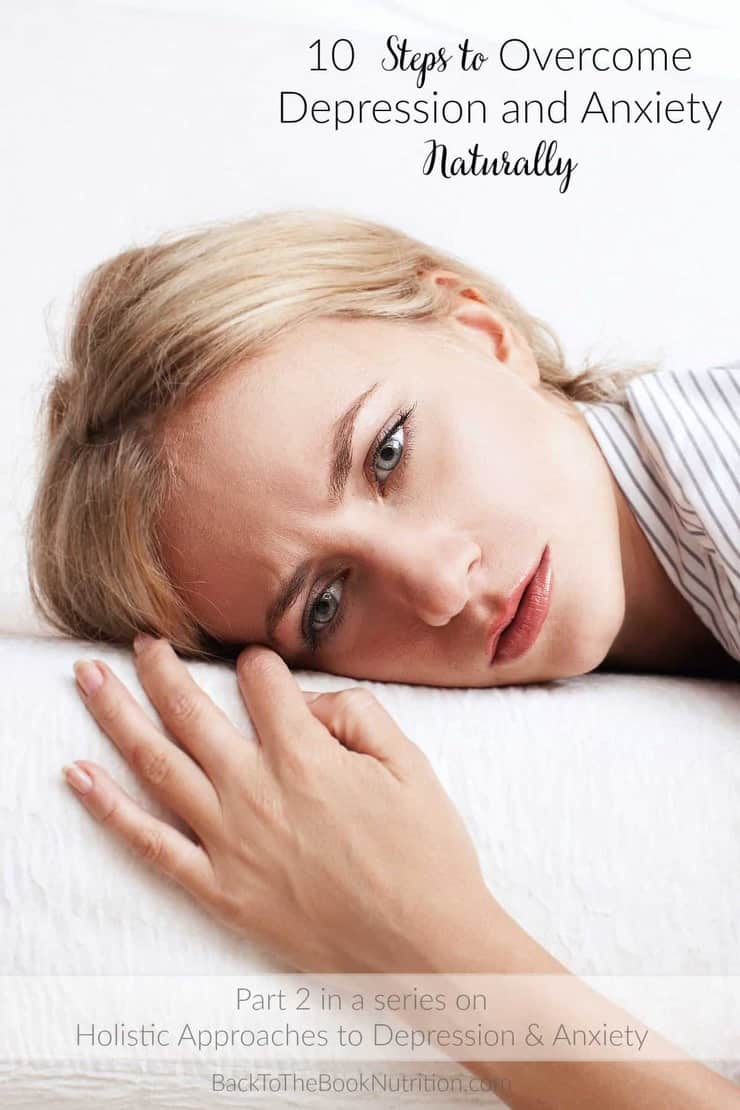10 natural approaches to depression and anxiety, including foods, supplements, sleep training, and more. Part 2 in a series on holistic approaches to depression and anxiety.
Read Part 1 in this Series here!
In Part 1 of this series on holistic approaches to common mood disorders, we discussed 6 overlooked root causes of depression and anxiety. In Part 2, we’ll learn how to address these mental health issues naturally.
10 Ways to Address Depression and Anxiety Naturally
1. Eat whole foods
Whole, nutrient-dense foods are rich in fiber, omega-3 fatty acids, antioxidants, amino acids, and other nutrients that help decrease inflammation and produce brain neurotransmitters. (1,4) In fact, one study showed that a whole foods (Mediterranean) diet was linked to a 30% decrease in depression(11).
Eat more of these foods:
- Fruits and vegetables, organic as much as possible. (3)
- Nuts, seeds, legumes, tubers.
- Wild caught fish* rich in omega 3 fatty acids.
- Meats, poultry, eggs, and dairy from animals raised on pasture
* Salmon, lake trout, mackerel (not king mackerel), herring, and sardines are all lower mercury choices.
Include Key Nutrients for Optimal Mood
In addition to eating a well rounded diet, make sure you’re including these key nutrients for optimal mood! (1,4,6,12,13)
Omega 3’s
- ROLE: Decrease inflammation and boost mood
- NATURAL SOURCES: Wild caught fatty fish and seafood and pasture raised meats
Vitamin D
- ROLE: Boost mood and help regulate circadian rhythm (described below)
- NATURAL SOURCES: Wild caught fatty fish, cod liver oil, pastured lard, raw milk, and eggs from pasture raised hens, and sunlight
Vitamins B2, B3, B6, B12
- ROLE: Essential for the production of neurotransmitters. Vitamin B2 also has antioxidant effects.
- NATURAL SOURCES:
Vitamin B2: whole organic soybeans, leafy greens, and pasture raised eggs and dairy products
Vitamin B3: pasture raised meats and poultry , and organ meats, wild caught fish and shellfish, sweet potatoes, sunflower seeds, brown rice, and barley
Vitamin B6: pasture raised meat, poultry, and organ meats, wild caught fish, potatoes, and bananas
Vitamin B12: pasture raised meat, poultry, and dairy products, and wild caught fish
Folate
- ROLE: Helps produce neurotransmitters
- NATURAL SOURCES: Green leafy vegetables, beans, and legumes
Iron
- ROLE: Some of the symptoms of iron deficiency are similar to depression or anxiety (irritability, extreme fatigue, restlessness) and can contribute to misdiagnose a mood disorder.
- NATURAL SOURCES (OF WELL ABSORBED HEME IRON): Lean, grass-fed meats and poultry, and wild caught fish
Zinc
- ROLE: Essential for normal brain function, can slow oxidative stress/damage
- NATURAL SOURCES: Grass-fed meats and poultry, nuts, and beans
Magnesium
- ROLE: Essential for normal brain function and stress response, deficiency can induce anxiety symptoms
- NATURAL SOURCES: Leafy vegetables, beans, whole grains, nuts, raw cacao
Copper
- ROLE: Helps produce mood boosting endorphins, deficiency can exacerbate anxiety symptoms
- NATURAL SOURCES: Oysters, shellfish, organ meats, leafy green vegetables, legumes
Selenium
- ROLE: Antioxidant, can reduce anxiety, and may help with postpartum depression
- NATURAL SOURCES: Brazil nuts, wild caught fish and shellfish, and pasture raised meats, poultry, eggs, and organ meats
Choline
- ROLE: Low levels are linked to anxiety, helps with neurotransmitter production
- NATURAL SOURCES: Pasture raised eggs, meat, organ meats, poultry, wild caught fish, whole organic soybeans
Minimize these foods:
- Processed foods
- Genetically modified organisms (GMOs) (2)
- Sugary foods and beverages
- Trans fats and interesterified fats in processed and fried foods
- Refined vegetable and seed oils high in omega-6 fats
- Conventional meats and dairy
- Gluten and possibly other grains, especially if you have symptoms of gluten sensitivity*(5)
* Symptoms of gluten sensitivity include foggy mind, headaches, rashes, fatigue, and mood changes
2. Correct nutrient deficiencies(1,6)
Due to soil depletion, genetic engineering, environmental toxins, poor gut health, genetic SNPs (“snips”) to genes such as MTHFR, COMT, and others, and other factors, it is possible that even those with the best diets aren’t absorbing and using the nutrients they’re eating as well as they should.
When nutrient levels are tested in individuals struggling with depression or anxiety, one or more of the key nutrients for mood listed above are commonly below recommended levels, and correcting them with diet and proper supplementation can help considerably in many cases.
Get help to identify and overcome nutrient deficiencies naturally with Holistic Nutrition Coaching!
3. Fix your gut (1)
The majority of our brain neurotransmitters like serotonin and dopamine are actually produced in the gut. Ninety percent of serotonin, for example, is produced in the intestines. A healthy gut, then, is critically important for a healthy brain.
In addition to eating a whole foods diet that combats inflammation and oxidative stress, eating lactofermented vegetables, cultured dairy, and other probiotic-rich foods, as well as taking high quality probiotic supplements can help to maintain a robust intestinal wall. Loading your diet with fiber will feed those beneficial bacteria in your gut.
If these basic approaches aren’t enough, it may be helpful to order an at-home stool test to identify pathogens, infections, leaky gut, or other imbalances that might be inhibiting neurotransmitter production, and to have a licensed practitioner walk you through the steps to overcome these naturally.
Identify and overcome gut infections & imbalances naturally with Holistic Nutrition Coaching!
4. Address thyroid dysfunction
In Part 1 of this series, we learned that up to 46% percent of individuals diagnosed with depression or anxiety actually have a thyroid condition instead. In my opinion, anyone struggling with symptoms of depression or anxiety should have a full thyroid panel with antibodies performed to rule out thyroid dysfunction and autoimmune thyroid diseases like Graves’ Disease and Hashimoto’s Thyroiditis.
Find out which thyroid tests you need and how to order them here!
5. Improve sleep habits & reset circadian rhythm (8)
Remember that poor sleep triggers your body’s stress response and increases inflammation.
Resetting your internal clock can help you get better quality sleep. When electronics and electric lighting constantly alter the day-night cycle, our sleep suffers –and so does our mood. Spending time outdoors, and avoiding artificial light when it is dark outside, will reset your circadian rhythm to match the light-dark cycles God built into nature.
In fact, one study showed that camping for just once week was able to reset circadian rhythm and greatly improve sleep. If going camping for a few days is not for you, try to be outdoors as soon as you wake up, spend as much time as you can in nature, and take advantage of natural lighting at home. And at sunset, wean off from electronics and slow down in preparation for good deep sleep.
Steps to Improve Your Sleep Naturally
- Set up a sleep schedule, and be asleep by 10 pm each night.
- Turn off your screens at least one hour before going to bed.
- Avoid caffeine and alcohol.
- Eat a lighter dinner and avoid snacking before bed.
- Use dim, warm light in the evening and expose yourself to sunlight in the morning.
- When all else fails, go camping!
Want more help with sleep? Take a 5-question Sleep Quality Quiz here and learn 5 things that sabotage sleep, and how to overcome them here!
6. Exercise (1)
Exercising in appropriate amounts helps to reduce inflammation. It also boosts endorphins, which are often called the brain’s “feel good chemicals” since they naturally suppress pain and boost mood.
Find an activity that you enjoy at an intensity level that invigorates you rather than exhausts you: walking, jogging, bicycling, dancing, etc. Doing these activities outdoors – even with indirect sunlight exposure – will double the mood boosting benefits!

7. Use relaxation techniques (11)
Try one or more of these stress relief techniques on a regular basis. These are great for kids as well as adults.
Gentle Relaxation Techniques
- Perform a series of deep breaths multiple times throughout the day:
Inhale for a count of 5-7 seconds, hold for a count of 5-7 seconds, then exhale forcefully for a count of 5-7 seconds.
- Progressive muscle relaxation (doing this while lying in the bed at night can help with sleep too!)
- Epsom salts soaking baths (allows magnesium from the Epsom salts to be absorbed through the skin)
- Prayer
- Gratitude journaling or other forms of journaling
- Singing
8. Maintain a healthy weight
Obesity is a state of chronic inflammation, which fuels depression and anxiety. On top of the physiological effects of inflammation, the emotional burden that many overweight and obese people feel further exacerbates their depression and anxiety. (8)
9. Consider natural supplements proven to help depression/anxiety
In combination with a good quality diet, several supplements have shown to be helpful in the treatment and management of anxiety and depression. These should always be discussed with your healthcare provider, since they are not right for everyone and may interact with one another or with medications, especially prescription antidepressants or antianxiety medications.
Neurotransmitter Support
These play important roles in the production and metabolism of brain neurotransmitters like serotonin, dopamine, GABA, and others.(1,14) Remember to consult with your provider before trying these, especially if you are taking prescription medications for depression or anxiety.
- L-Theanine
- Tryptophan or 5-HTP (a specific form of tryptophan)
- Taurine
- S-adenosyil methionine (SAMe)
Learn more about my 2 favorite supplements for anxiety here!
Herbal adaptogens
These are herbal preparations that can help in mood disorders by acting at the Hypothalamic-Pituitary-Adrenal (HPA) axis, which helps regulate stress response and support hormone balance, among other things.(9,15) Remember to consult with your provider before trying these, especially if you are taking prescription medications for depression or anxiety.
- Eleuthero
- Rhodiola
- Ashwagandha
Do not take any herbal adaptogen if you are pregnant or planning to become pregnant.
Other herbs
Many herbs have been touted as natural mood enhancers over the years, and these are just a few with scientific data to support their use.(16) Remember to consult with your provider before trying these, especially if you are taking prescription medications for depression or anxiety.
- St. John’s Wort
- Kava
- Passion Flower
- Lavender
- Chamomile
Do not take any herbal products without first consulting your healthcare practitioner if you are pregnant or plan to become pregnant.
Cannabidiol (CBD Oil)
CBD is the non-hallucinogenic component of cannabis and has been shown to help with generalized anxiety disorder, panic disorder, social anxiety disorder, obsessive–compulsive disorder, and post-traumatic stress disorder. (17)
Do not take CBD products without first consulting your healthcare practitioner if you are pregnant or plan to become pregnant.
10. Get Counseling
I cannot overstate the benefits of good counseling from a licensed professional counselor (LPC). Sometimes talking through your struggles with a compassionate, objective, and knowledgeable therapist can make all the difference. Do your research to find a counselor who is well matched with your personality, spiritual beliefs, and health philosophy, since all of these are integral aspects of effective counseling.
Disclaimer: Information on this site is intended only for informational purposes and is not a substitute for medical advice. Always consult with a trusted healthcare provider before implementing significant dietary of lifestyle changes. If you are having suicidal thoughts, or considering harming yourself or others, please reach out for medical care immediately by calling 911, calling the Suicide Helpline at 1-800-SUICIDE, or by texting 741741 from anywhere in the United States. Read additional disclaimer info here.
References
- Madonna, K. (2017). Integrative Nutrition Therapy for Mood Disorders, Today’s Dietitian.
- Bawa, A.S., & Anilakumar, K.R. (2013). Genetically modified foods: safety, risks and public concerns—a review. Journal of Food Science and Technology, 50, 1035-1046.
- Mie, A., Andersen, H.R., Gunnarsson, S., Kahl, J., Kesse-Guyot, E., Rembilkowska, E., Quaglio, G., & Grandjean, P. (2017). Human health implications of organic food and organic agriculture: a comprehensive review. Environmental Health, 16, 111.
- White, B. A., Horwath, C. C., & Conner, T. S. (2013). Many apples a day keep the blues away–daily experiences of negative and positive affect and food consumption in young adults. British journal of health psychology, 18(4), 782–798. https://doi.org/10.1111/bjhp.12021
- Catassi, C. (2015). Gluten sensitivity. Annals of Nutrition and Metabolism, 67, 16-26.
- Oregon State University. Linus Pauline Institute (2017). Micronutrient Information center.
- Wright Jr., K.P., McHill, A.W., Birks B.R., Griffin, B.R., Rusterholz, T., and Evan D.& Chinoy,E.D. (2013). Entrainment of the human circadian clock to the natural light-dark cycle. Current Biology, 23, 1554-1558.
- Kiecolt-Glaser, J.K., Derry, H.M., & Fagundes, C.P. (2015). Inflammation: Depression Fans the Flames and Feasts on the Heat. American Journal of Psychiatry, 172, 1075–1091.
- Panossian, A., & Wikman, G. (2010). Effects of adaptogens on the central nervous system and the molecular mechanisms associated with their stress-protective activity. Pharmaceuticals , 3, 188-224.
- University of Wisconsin Integrative Medicine (n.d.) Integrative approaches to anxiety: easing the fear.
- Jacka, et al. (2017). A randomised controlled trial of dietary improvement for adults with major depression (the ‘SMILES’ trial). BMC Medicine, 15, 1.
- SpectraCell Laboratories. (2012). Disease Wheel: Anxiety. Retrieved from: https://www.spectracell.com/media/uploaded/d/0e2007949_disease-wheel-anxiety.pdf.
- SpectraCell Laboratories. (2012). Nutritional Correlation Chart on Depression. Retrieved from: http://info.spectracell.com/bid/82384/SpectraCell-s-Nutritional-Correlation-Chart-on-DEPRESSION.
- Nett, Amy. (2015). Heal Your Gut, Heal Your Brain. Retrieved from: https://chriskresser.com/functional-medicine-approach-to-anxiety/.
- Bongiorno, Peter. (2014). Ashwagandha for Anxiety. Retrieved from: https://www.psychologytoday.com/blog/inner-source/201401/ashwaganda-anxiety.
- Ernst, Edzard. (2007). Herbal remedies for depression and anxiety. Advances in Psychiatric Treatment, 13, 312–316.
- Bergamischi, M., et al. (2015). Cannabidiol as a Potential Treatment for Anxiety Disorders. Neurotherapeutics, 22(4):825-836.



I think Whole Foods are so important. I always say Food Affects your Mood!
It is true Kiwi!
We are really what we eat. And I definitely agree that these vitamins or minerals has a great effect with our mental health. Thanks for tips!
Depression is really a thing. Sadly most people are going through it without able to speak out. This is a lovely info to those that feel vulnerable to life issues.
This is such helpful information. I have been struggling with postpartum anxiety! Can’t wait to try these tips out. Thank you!
While these are great tips, I don’t want to discredit or discourage anyone who needs to go on medication. There is so much shame surrounding surrendering to your anxiety and depression and mental health issues. This May we should focus on those who NEED help. Encourage them to get it.
I love that you included the benefits of the key nutrients. Staying healthy is indeed a great and beneficial step.
These are amazing! I had no idea that vitamins affect our mood or depression, this is awesome! I am meditating daily, this is really helping me a lot.
Thanks for this great article, after my divorce I’ve battled depression and anxiety and I didnt want to use the prescription drugs. It’s tough sometimes to get moving when depressed but a well balance diet exercise if just walking and my very good therapist help move me forward and out of the blues. I bookmark this article and will add more from it to my daily routine. Thank you, thank you
It’s wonderful you’ve found some relief!
Actually, nutrition is of great importance. I so agree with you and this post was such a nice read!
Thanks!
I have heard that different foods can help with depression and anxiety. Definitely something worth looking into some more. Thanks for sharing.
You’re welcome!